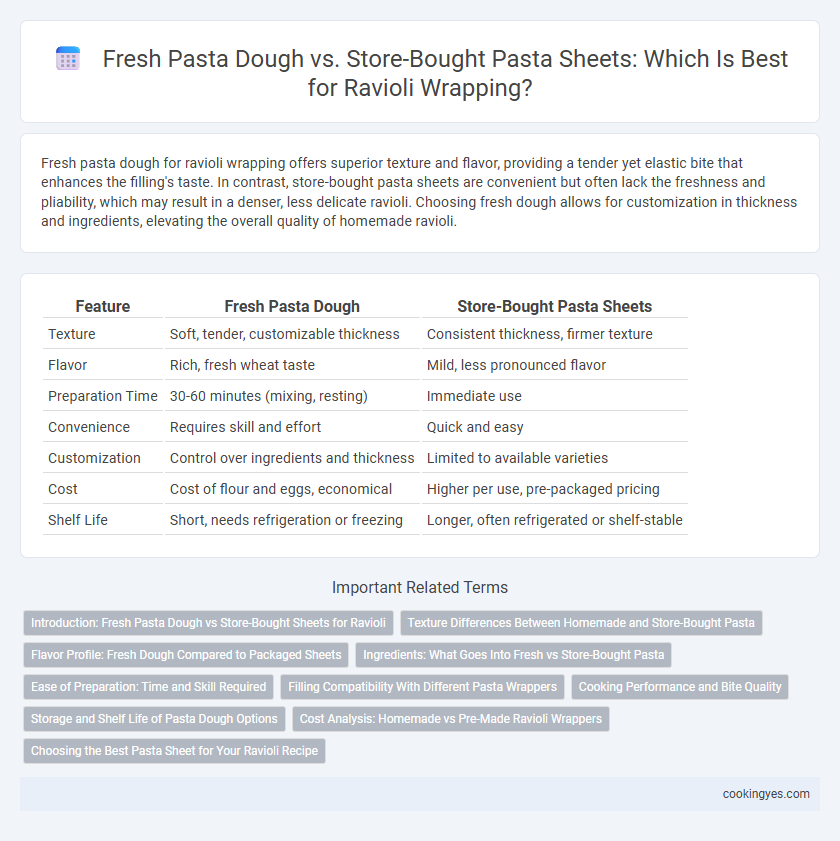Fresh pasta dough for ravioli wrapping offers superior texture and flavor, providing a tender yet elastic bite that enhances the filling's taste. In contrast, store-bought pasta sheets are convenient but often lack the freshness and pliability, which may result in a denser, less delicate ravioli. Choosing fresh dough allows for customization in thickness and ingredients, elevating the overall quality of homemade ravioli.
Table of Comparison
| Feature | Fresh Pasta Dough | Store-Bought Pasta Sheets |
|---|---|---|
| Texture | Soft, tender, customizable thickness | Consistent thickness, firmer texture |
| Flavor | Rich, fresh wheat taste | Mild, less pronounced flavor |
| Preparation Time | 30-60 minutes (mixing, resting) | Immediate use |
| Convenience | Requires skill and effort | Quick and easy |
| Customization | Control over ingredients and thickness | Limited to available varieties |
| Cost | Cost of flour and eggs, economical | Higher per use, pre-packaged pricing |
| Shelf Life | Short, needs refrigeration or freezing | Longer, often refrigerated or shelf-stable |
Introduction: Fresh Pasta Dough vs Store-Bought Sheets for Ravioli
Fresh pasta dough offers superior elasticity and flavor, allowing ravioli to seal more effectively and deliver a tender, homemade texture. Store-bought pasta sheets provide convenience and consistent thickness, making them ideal for quick preparation without sacrificing shape. Choosing fresh dough enhances customization with ingredients like herbs or spinach, while store-bought sheets streamline the assembly process.
Texture Differences Between Homemade and Store-Bought Pasta
Fresh pasta dough for ravioli offers a tender, silky texture that melts smoothly in the mouth, providing a delicate bite that complements fillings perfectly. Store-bought pasta sheets tend to have a firmer, slightly rubbery texture due to preservatives and drying processes, which can result in less elasticity and a chewier end product. Homemade dough's moisture content and elasticity allow for a more pliable and seamless seal around the filling, enhancing both the texture and overall eating experience.
Flavor Profile: Fresh Dough Compared to Packaged Sheets
Fresh pasta dough offers a richer, more delicate flavor due to its high-quality ingredients and immediate preparation, enhancing the overall ravioli taste. Store-bought pasta sheets often contain preservatives and have a denser texture, which can mute the subtle flavors of the filling. Chefs prefer fresh dough for its ability to absorb sauces and maintain a tender bite, elevating the ravioli dining experience.
Ingredients: What Goes Into Fresh vs Store-Bought Pasta
Fresh pasta dough for ravioli typically contains simple, high-quality ingredients such as flour, eggs, salt, and sometimes a drizzle of olive oil, creating a tender and pliable texture ideal for sealing delicate fillings. Store-bought pasta sheets often include preservatives, stabilizers, and sometimes added coloring agents to enhance shelf life and maintain consistent texture, which can slightly alter the flavor and elasticity compared to fresh dough. The purity of ingredients in fresh dough offers superior taste and customizable texture, while store-bought options provide convenience with a longer shelf life.
Ease of Preparation: Time and Skill Required
Fresh pasta dough offers superior texture and flavor for ravioli but demands more preparation time and advanced culinary skills, including precise kneading and rolling. Store-bought pasta sheets significantly reduce preparation time and simplify the process, making them ideal for beginners or quick meals. Choosing between the two depends on balancing convenience with the desired authenticity in ravioli texture.
Filling Compatibility With Different Pasta Wrappers
Fresh pasta dough offers superior flexibility and delicate texture, which enhances the flavor harmony with soft or creamy fillings like ricotta and spinach, ensuring a tender bite that complements these ingredients. Store-bought pasta sheets tend to be firmer and less pliable, making them better suited for heartier fillings such as meat or mushroom ragu, as the thicker wrapper provides structural support and prevents tearing during cooking. Choosing the appropriate pasta wrapper significantly impacts the overall ravioli experience by balancing texture and filling moisture levels for optimal taste and presentation.
Cooking Performance and Bite Quality
Fresh pasta dough offers superior elasticity and tenderness, resulting in ravioli with a delicate, pillowy bite and even cooking throughout. Store-bought pasta sheets tend to be firmer and less pliable, which can lead to uneven cooking and a chewier texture. The moisture content in fresh dough enhances the ravioli's ability to meld with fillings, providing a more balanced flavor and mouthfeel compared to commercial sheets.
Storage and Shelf Life of Pasta Dough Options
Fresh pasta dough for ravioli offers superior texture and flavor but has a significantly shorter shelf life, typically lasting only 1-2 days when refrigerated. Store-bought pasta sheets provide convenience and longer storage options, remaining fresh in the refrigerator for up to a week or frozen for several months without compromising quality. Proper storage in airtight containers or vacuum-sealed bags is crucial to maintain freshness and prevent drying or spoilage for both fresh and store-bought pasta sheets.
Cost Analysis: Homemade vs Pre-Made Ravioli Wrappers
Homemade fresh pasta dough typically costs less per serving compared to store-bought pasta sheets, with ingredients like flour, eggs, and water being affordable and yielding multiple batches. Store-bought pasta sheets often come at a higher price due to convenience and packaging but save time in preparation. Evaluating cost-effectiveness depends on balancing ingredient expenses against labor and cooking time invested in making fresh dough versus using pre-made wrappers.
Choosing the Best Pasta Sheet for Your Ravioli Recipe
Fresh pasta dough offers superior elasticity and a delicate texture that enhances the overall flavor and mouthfeel of ravioli, making it ideal for homemade recipes. Store-bought pasta sheets provide convenience and consistent thickness, suitable for quick preparation but may lack the authentic taste and softness of fresh dough. Selecting between fresh and store-bought pasta sheets depends on the desired balance between craftsmanship, cooking time, and texture quality in your ravioli dish.
Fresh pasta dough vs Store-bought pasta sheets for ravioli wrapping Infographic

 cookingyes.com
cookingyes.com